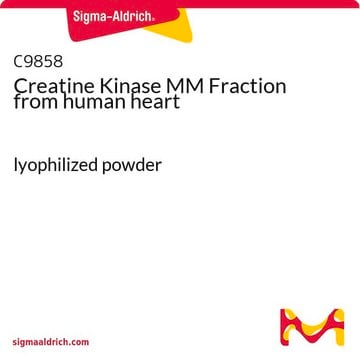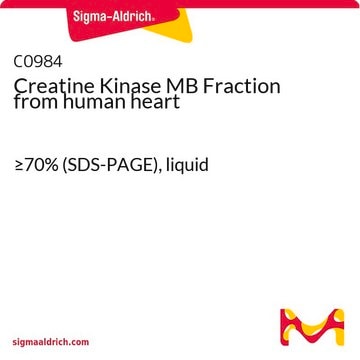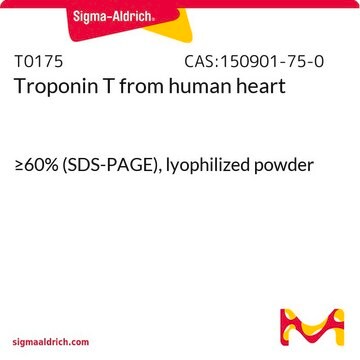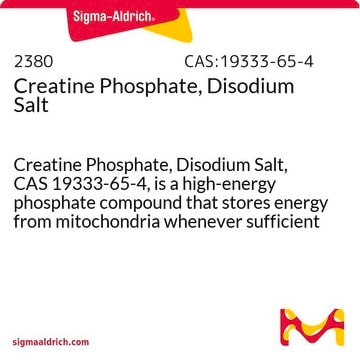C9983
Creatine Kinase BB Fraction human
≥90% (SDS-PAGE), liquid, recombinant, expressed in Pichia pastoris
Sign Into View Organizational & Contract Pricing
All Photos(1)
About This Item
Recommended Products
General description
Solution in 50% glycerol, Tris buffer with 10 mM Bis-Tris-HCl, 0.5mM DTT, 0.5mM EDTA
Application
Human creatine kinase BB fraction has been used to investigate the survival benefit of the late percutaneous coronary intervention in patients after acute myocardial infarction. Human creatine kinase BB fraction has also been used in a study to analyze protein oxidations and resultant loss of function.
Biochem/physiol Actions
The product is used as a control in monitoring levels in cerebrospinal fluid by ELISA. Creatine kinase (CK) BB is a member of the CK gene family and is a cytosolic CK isoform present in the brain. The molecular mass is found to be 35-50 kDa. CKs catalyze the reversible transfer of a phosphoryl group between ATP and creatine. It plays an important role in the regulation of ATP level in neural cells. Therefore, a decrease in CK BB activity is one of the biochemical markers of the CNS cell damage in age-related neurodegenerative diseases such as Alzheimer′s disease, Pick′s disease, and Lewy body dementia.
Unit Definition
One unit will transfer 1.0 μmole of phosphate from creatine phosphate to ADP per minute at 37 °C (measured at 340 nm as one equimolar amount of NADH produced by coupled reaction).
Storage Class Code
10 - Combustible liquids
WGK
WGK 2
Flash Point(F)
Not applicable
Flash Point(C)
Not applicable
Certificates of Analysis (COA)
Search for Certificates of Analysis (COA) by entering the products Lot/Batch Number. Lot and Batch Numbers can be found on a product’s label following the words ‘Lot’ or ‘Batch’.
Already Own This Product?
Find documentation for the products that you have recently purchased in the Document Library.
Customers Also Viewed
Bozidarka Knezević et al.
Bosnian journal of basic medical sciences, 9(1), 54-58 (2009-03-17)
The impact of late percutaneous coronary intervention (PCI) in the patients after acute myocardial infarction (AMI) on long term mortality remains to be established. At currently, thrombolysis is accepted as standard therapy when PCI is not immediately available. However, PCI
Loïc Dayon et al.
Analytical chemistry, 80(8), 2921-2931 (2008-03-04)
A new 6-plex isobaric mass tagging technology is presented, and proof of principle studies are carried out using standard protein mixtures and human cerebrospinal fluid (CSF) samples. The Tandem Mass Tags (TMT) comprise a set of structurally identical tags which
Rezwan Siddiquee et al.
Bio-protocol, 11(10), e4019-e4019 (2021-06-22)
Cell-free synthesis is a powerful technique that uses the transcriptional and translational machinery extracted from cells to create proteins without the constraints of living cells. Here, we report a cell-free protein production protocol using Escherichia coli lysate (Figure 1) to
T Talvik et al.
Acta paediatrica (Oslo, Norway : 1992), 84(10), 1183-1187 (1995-10-01)
Creatine kinase isoenzyme BB was determined in cerebrospinal fluid (CSF) in 79 preterm neonates using an original enzyme-linked immunosorbent assay. The criterion for inclusion was an Apgar score of 7 or less at 5 min of life. Neurological examination was
M Aksenov et al.
Journal of neurochemistry, 74(6), 2520-2527 (2000-05-23)
Creatine kinase (CK) BB, a member of the CK gene family, is a predominantly cytosolic CK isoform in the brain and plays a key role in regulation of the ATP level in neural cells. CK BB levels are reduced in
Our team of scientists has experience in all areas of research including Life Science, Material Science, Chemical Synthesis, Chromatography, Analytical and many others.
Contact Technical Service












